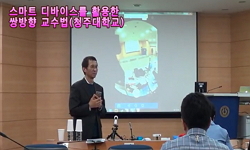We live in the world where everything is being globalizyd. As Ohmae (1995) once argued, as years gone by, we are likely to witness more and more traditional borderlines lowering, and we may expect thyme to disappear and diversity to prevail ultimately...
http://chineseinput.net/에서 pinyin(병음)방식으로 중국어를 변환할 수 있습니다.
변환된 중국어를 복사하여 사용하시면 됩니다.
- 中文 을 입력하시려면 zhongwen을 입력하시고 space를누르시면됩니다.
- 北京 을 입력하시려면 beijing을 입력하시고 space를 누르시면 됩니다.
'국어상담소'의 전략과 실제 : 국가지정 청주대학교 국어상담소를 중심으로 = Development A New Strategy for the National Institute of Korean Language Clinic at Cheongju University
한글로보기부가정보
다국어 초록 (Multilingual Abstract)
We can easily notice that this phenomenon is threatening the Korean language education targeting foreigners and immigrants especially. First, the foreigners who do not speak English as their first language have more reason to try to learn it than ever before. We can assume that they are more likely to come across strangers who can understand English than those who can not in any kind of international atmosphere. Here, lacking English-speaking capability seems equivalent to having a certain liability. Second, whatever the definition, the human society appears to transform to the knowledge-based one. Even in this transition, the leadership of the English-speaking Anglo-Saxon countries does not seem to mitigate. Rather, many statistics show that more infatuations are produced and circulated in English than previously. It means that society must speak English also. In this environment where socially as well as personally English already became a must, people who are eager to learn foreign languages should assign their precious time between English and the other foreign languages. The idealism that all languages should be appraised equal does not apply any more. Third, the more people study English, the wider the epistemic community [see Haas (1992)] based on English becomes. Regardless of how fluently they speak English, the people who were exposed to it would develop the tendency to interpret other cultures reflecting on the image that it provides. As a result, the foreigners and immigrants who are studying Korean with prior experience of English lesson might have more difficulty to understand Korean than those without.
Therefore, we can say that the Korean only education would become less effective under the rampant English expansion like presently. However, when looking closely at the above-mentioned consequences, we find that if we are allowed to modify the current strategy so that Korean and English could be taught together, there would be a chance to improve its effectiveness.
We live in the world where everything is being globalizyd. As Ohmae (1995) once argued, as years gone by, we are likely to witness more and more traditional borderlines lowering, and we may expect thyme to disappear and diversity to prevail ultimately. However, in linguistic field, something quite different is happening. We have seen English ascend to the status of global language rather than all the languages become evenly popular. It is true that English was a major international language (Edward's, 1994) before. Nonetheless, it seems that globalization did not let English remained that way. Some began to consider English as a new common tongue after Babel (Economist, Auk 7, 2004). Others even do not hesitate to dream the new world where English unifies all the human languages to become truly universal (Newswyyk, Mar 7, 2005).
We can easily notice that this phenomenon is threatening the Korean language education targeting foreigners and immigrants especially. First, the foreigners who do not speak English as their first language have more reason to try to learn it than ever before. We can assume that they are more likely to come across strangers who can understand English than those who can not in any kind of international atmosphere. Here, lacking English-speaking capability seems equivalent to having a certain liability. Second, whatever the definition, the human society appears to transform to the knowledge-based one. Even in this transition, the leadership of the English-speaking Anglo-Saxon countries does not seem to mitigate. Rather, many statistics show that more infatuations are produced and circulated in English than previously. It means that society must speak English also. In this environment where socially as well as personally English already became a must, people who are eager to learn foreign languages should assign their precious time between English and the other foreign languages. The idealism that all languages should be appraised equal does not apply any more. Third, the more people study English, the wider the epistemic community [see Haas (1992)] based on English becomes. Regardless of how fluently they speak English, the people who were exposed to it would develop the tendency to interpret other cultures reflecting on the image that it provides. As a result, the foreigners and immigrants who are studying Korean with prior experience of English lesson might have more difficulty to understand Korean than those without.
Therefore, we can say that the Korean only education would become less effective under the rampant English expansion like presently. However, when looking closely at the above-mentioned consequences, we find that if we are allowed to modify the current strategy so that Korean and English could be taught together, there would be a chance to improve its effectiveness.
목차 (Table of Contents)
- 目次
- 1. 시작하는 말
- 2. 국어의식의 위기 실제
- 3. 지식/정보의 측면에서 보는 ‘국어상담소’
- 4. ‘국어상담소’의 국어수요층위
- 目次
- 1. 시작하는 말
- 2. 국어의식의 위기 실제
- 3. 지식/정보의 측면에서 보는 ‘국어상담소’
- 4. ‘국어상담소’의 국어수요층위
- 5. 다문화사회의 접점(interface)인 ‘국어상담소’
- 6. 맺는 말
- 참고문헌
- Abstract
동일학술지(권/호) 다른 논문
-
- 청주대학교 인문과학연구소
- 王立杰
- 2007
-
- 청주대학교 인문과학연구소
- 김미경
- 2007
-
- 청주대학교 인문과학연구소
- 朴建榮
- 2007
-
- 청주대학교 인문과학연구소
- 양희철
- 2007




 RISS
RISS



